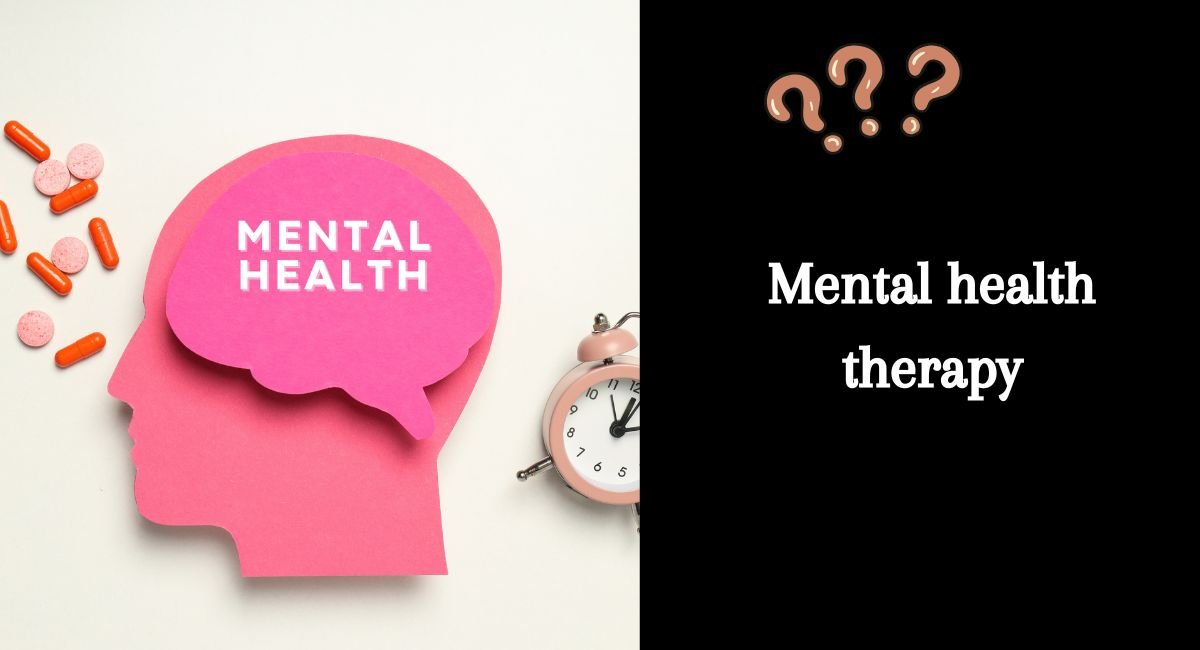Mental health therapy plays a key role in helping people deal with emotional challenges, build resilience, and improve their mental well-being. It’s more than just about treating mental illnesses. It’s about understanding ourselves better and learning new ways to cope with life’s ups and downs.
Whether you’re struggling with stress, anxiety, depression, or just want to improve how you feel day-to-day, mental health therapy offers support. In this post, we’ll break down what therapy is, how it works, and how it can help you. If you’ve ever thought about seeking therapy, this guide will help you decide if it’s right for you.
Table of Contents
ToggleWhat Is Mental Health Therapy?
Mental health therapy, also known as psychotherapy or counseling, is a treatment where you talk to a trained therapist about your thoughts, feelings, and behaviors. It’s a space where you can discuss what’s on your mind in a safe, confidential setting.
Therapy is not just for people dealing with major mental health issues. It’s for anyone looking to understand themselves better, cope with stress, or work through difficult emotions. A therapist helps you explore your problems, find ways to deal with them, and make positive changes in your life.
Therapy sessions usually happen one-on-one, but there are also group therapy options. The therapy type that’s best for you depends on your needs and what you’re hoping to achieve.
Types of Mental Health Therapy
There are several types of therapy. Each one focuses on different techniques to help people understand their emotions and improve their mental well-being. Let’s look at a few of the most common types.
1. Cognitive Behavioral Therapy (CBT)
CBT is one of the most popular forms of therapy. It focuses on identifying and changing negative thought patterns that affect behavior and emotions. If you often find yourself overthinking or seeing everything in a negative light, CBT can help.
In CBT, you’ll work with a therapist to change unhelpful thoughts. For example, if you often think “I’m not good enough,” your therapist will help you see that this thought isn’t true and show you how to reframe it. Over time, these small changes can make a big difference in how you feel.
2. Psychodynamic Therapy
Psychodynamic therapy explores how your past, especially early childhood experiences, affects your present-day feelings and behavior. The goal is to bring awareness to unconscious thoughts and patterns that influence your actions today.
A psychodynamic therapist might ask you about your past, especially about your relationships with your family or any unresolved trauma. Understanding these influences can help you see how they shape your current life. This type of therapy can be a bit longer, but it can lead to deep emotional healing.
3. Dialectical Behavior Therapy (DBT)
DBT is a type of CBT that’s particularly helpful for people who struggle with intense emotions, such as those with borderline personality disorder. DBT helps you manage strong feelings and improve your relationships.
In DBT, you’ll learn skills in four areas: mindfulness, distress tolerance, emotional regulation, and interpersonal effectiveness. These skills can help you stay calm in stressful situations, make better decisions, and strengthen your relationships.
4. Humanistic Therapy
Humanistic therapy focuses on helping you grow and realize your full potential. It’s based on the belief that everyone has the ability to make positive changes and live a fulfilling life.
A key part of humanistic therapy is the relationship between the therapist and client. The therapist provides a supportive, non-judgmental environment that encourages you to explore your feelings. This approach helps build self-esteem and self-awareness, empowering you to make meaningful changes.
5. Family and Couples Therapy
Family and couples therapy involves working with multiple people at once to address issues within a relationship. It’s often used when there’s tension between family members or partners.
The goal is to improve communication, resolve conflicts, and strengthen the bond between people. Whether it’s a couple struggling with communication or a family dealing with a major change, therapy can help everyone involved understand each other better and work toward healthier relationships.
Why Mental Health Therapy Matters
Therapy isn’t just for people with mental health problems. It’s a tool that can help anyone improve their emotional well-being and live a more balanced life. Here are some reasons why therapy matters:
1. Helps You Manage Stress
Life can be overwhelming. Therapy teaches you how to manage stress, stay calm under pressure, and deal with everyday challenges. By developing coping strategies, you can handle difficult situations without feeling overwhelmed.
2. Improves Emotional Regulation
We all feel intense emotions from time to time. Therapy helps you understand these emotions and manage them better. Whether it’s sadness, anger, or anxiety, a therapist can teach you techniques to keep your emotions in check and respond calmly.
3. Strengthens Relationships
Therapy isn’t just about personal growth—it can also improve your relationships. Learning how to communicate better, listen to others, and manage conflicts can help you build stronger connections with the people around you.
4. Supports Personal Growth
Therapy is also about helping you grow as a person. It can give you the tools to break free from unhealthy patterns, make better decisions, and live a life that aligns with your values and goals.
5. Fosters Self-Awareness
Therapy encourages you to think about your thoughts, behaviors, and emotions in a new way. This self-awareness helps you understand why you do the things you do, which can lead to healthier choices and better self-esteem.
When to Consider Therapy
Deciding to seek therapy is a personal choice. Here are some signs that therapy might be right for you:
- You’re feeling sad or down for a long time: If you’ve been feeling hopeless or stuck, therapy can help you find a way forward.
- You’re overwhelmed by stress: Life can get tough. Therapy can help you manage your stress and regain control.
- You’re having trouble with relationships: Whether it’s a partner, friend, or family member, therapy can help you improve your relationships and understand each other better.
- You’re facing a major life change: Moving to a new city, changing jobs, or going through a breakup can be tough. Therapy can help you adjust and feel more at ease.
- You’re struggling with anxiety or depression: If you’re feeling anxious or depressed and it’s affecting your daily life, therapy is a great option for getting support.
How to Choose the Right Therapist
Choosing the right therapist is important for getting the most out of your sessions. Here are some tips for finding the right fit:
1. Look for Credentials
Make sure your therapist is licensed and has the appropriate training. Look for someone with experience in treating the issues you’re dealing with. For example, if you’re dealing with anxiety, find a therapist who specializes in anxiety treatment.
2. Consider Their Approach
Therapists have different ways of working with clients. Some use CBT, while others might focus on psychodynamic or humanistic therapy. It’s helpful to understand the type of therapy your potential therapist uses to make sure it aligns with your needs.
3. Find Someone You Feel Comfortable With
It’s important to feel comfortable with your therapist. You need to be able to talk openly about your thoughts and feelings. If you don’t feel a good connection after a few sessions, it’s okay to try a different therapist.
4. Check for Availability and Cost
Consider factors like location, schedule, and cost when choosing a therapist. Some therapists offer sliding scale fees or work with insurance companies, so check for options that fit your budget and needs.
Conclusion
Mental health therapy is a powerful tool for improving your emotional well-being and gaining a deeper understanding of yourself. Whether you’re struggling with mental health challenges or simply looking to improve how you feel, therapy can provide support and guidance. By choosing the right therapist and therapy type, you can develop the skills needed to manage stress, improve relationships, and lead a more balanced life.
Remember, therapy isn’t just for people who are struggling—it’s for anyone who wants to feel better and live a more fulfilling life. If you’re thinking about therapy, it’s worth considering the benefits and how it might help you grow.
Frequently Asked Questions (FAQ)
1. How long will I need therapy?
The length of therapy depends on your goals and the issues you’re dealing with. Some people may only need a few sessions, while others might benefit from ongoing therapy. Your therapist will work with you to set goals and determine how long therapy will be.
2. Can therapy help with anxiety and depression?
Yes, therapy is a highly effective treatment for anxiety and depression. Types of therapy like CBT have been shown to help people manage symptoms and improve their quality of life.
3. Is therapy confidential?
Yes, therapy is confidential. Your therapist cannot share what you discuss in sessions without your consent, except in certain situations (e.g., if you’re at risk of harming yourself or others).
4. Can I do therapy online?
Yes, many therapists offer online sessions, especially through video calls. Online therapy is a great option if you’re unable to attend in-person sessions or prefer the convenience of therapy from home.
5. Do I need a referral to see a therapist?
In most cases, you do not need a referral to see a therapist. However, if you’re using insurance, you may need to check with your provider to see if a referral is required.

